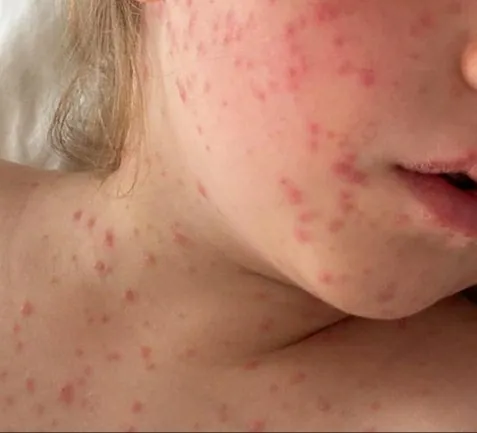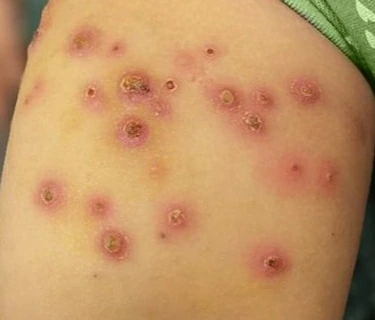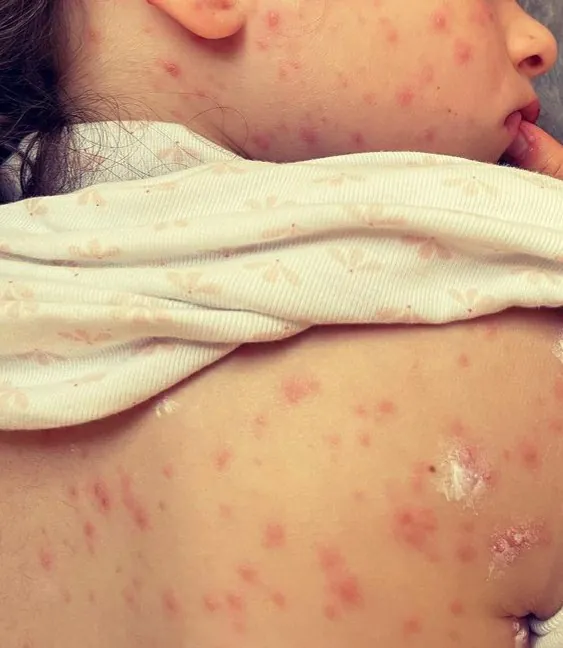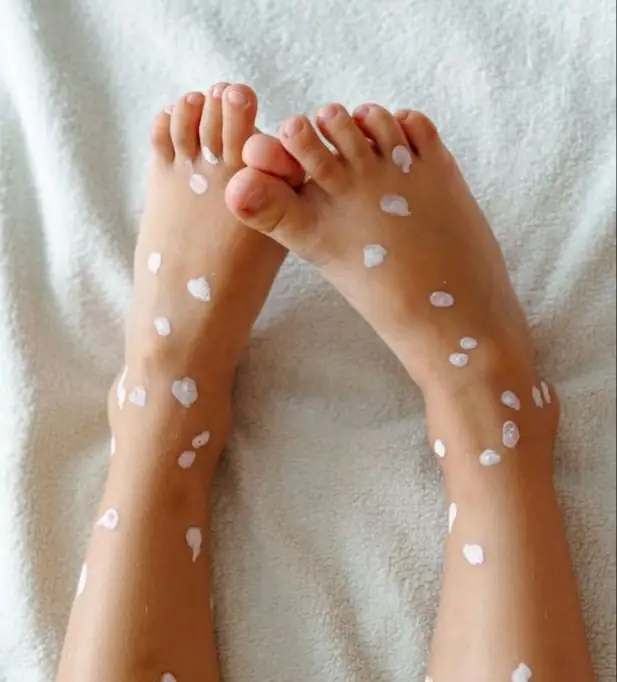Chickenpox: Definition, Cause, Symptom and Treatment
🏾 Summary :
🏾 What is Chickenpox ?
Chickenpox is a highly contagious infection caused by the varicella-zoster virus (VZV, a virus in the herpes family). The virus causes a rash that forms small fluid-filled blisters that itch and crust over.
- Primary infection with VZV causes Chickenpox. Afterwards, we are immune to this disease for life.
- In part of the population, the virus can reappear in adulthood and cause shingles.
Mostly benign, typically infantile, Chickenpox mainly affects children aged 2 to 8 years, but can sometimes occur in adults. It often appears by epidemic, particularly in spring.
VZV can be passed from person to person through contact with the rash of an infected person.
And it can spread through the air through a cough or sneeze.
The incidence of this disease decreased considerably after the introduction of the vaccine. Since 1995, when the varicella vaccine was licensed in the USA, the incidence of Chickenpox has decreased by more than 80%
🏾 How do I catch Chickenpox ?
Chickenpox is contagious 1-2 days before the rash appears until all the blisters dry up and become scabs.
She is very contagious. The virus can be transmitted from person to person by:
- Direct contact.
- Via aerosols from the respiratory tract of an infected person (by coughing and sneezing).
- Inhalation of aerosols from the vesicular fluid of skin lesions of acute varicella or shingles.
- With contaminated material.
Note : Vaccinated persons may develop lesions that do not form a scab. These people are considered contagious as long as no new lesions have appeared for 24 hours.
🏾 What are the symptoms of Chickenpox ?
Once a person is exposed to the virus, Chickenpox can take up to 14 to 16 days to appear (with extremes between 10 and 21 days). The illness usually lasts about 4 to 7 days.
Prodromes such as fever, fatigue, loss of appetite, headache, abdominal pain precede the appearance of the rash by 24 to 48 hours.
The rash is generalized and itchy. It progresses rapidly from macular to papular to vesicular (fluid-filled) lesions before crusting (after about 5-7 days). The lesions are generally present at all stages of development at the same time. The rash usually appears first on the chest, back, and face and then spreads all over the body, including inside the mouth, eyelids, or area genital.

Note : In healthy children, Chickenpox is usually mild. Infants, adolescents, adults, pregnant women, and immunocompromised people are at risk for more severe disease and have a higher incidence of complications.
🏾 Complications of Chickenpox
These complications are rare but serious. They are more common in infants under 12 months, adolescents, adults, pregnant people and people with weakened immune systems.
- Bacterial superinfection: This is the most common, it affects the skin or other parts of the body, including bones, lungs, joints and blood. The germs in question are most often Staphylococcus aureus and Streptococcus pyogenes
- Neurological complications: Encephalitis, acute cerebellar ataxia.
- Pneumonia: It occurs more frequently in
adults and immunocompromised subjects.
- Sepsis
- Thrombocytopenia and vascular thromboses
- Hepatitis
- Dehydration
- Deaths are very rare.
🏾 Diagnosis
Diagnosis of Chickenpox infection is based primarily on signs and symptoms. If in doubt about the diagnosis, Chickenpox can be confirmed by laboratory tests, including blood tests or culture of lesion samples.
How to recognize a Chickenpox pimple ?
The rash first appears on the chest, back, and face, then spreads all over the body, starting with many small red bumps that look like pimples or insect bites. They appear in waves over 2-4 days, due to these successive outbreaks, not all chickenpox pimples will be at the same stage at the same time, then turn into thin-walled, fluid-filled blisters (between 250 and 500 blisters) .
As the blisters open, the sores scab over as they heal. These sores appear as dry, crusty scabs on the skin.
Note: During this phase, wounds can easily become infected and can cause: Impetigo, Erysipelas, Cellulitis.

Chickenpox pimples

Chickenpox pimples
Laboratory tests: detection of viral antigens, detection of specific antibodies, culture or by PCR are recommended for:
- Confirm suspected cases.
- Confirm varicella in severe or unusual cases.
- Determine susceptibility to varicella.
- Determine HIV status before vaccination or in pregnant women
- Determine whether suspected vaccine-related adverse events were caused by vaccine strain VZV.
Note: The PCR test of skin lesion specimens remains the most practical and accurate method for diagnosing Chickenpox in vaccinated and unvaccinated individuals.
🏾 Treatment
In healthy children, Chickenpox usually requires no medical treatment and recovery usually occurs within 2 weeks. However, your doctor can prescribe an antihistamine to relieve itching, antibiotics in case of superinfection or antivirals in certain very specific cases.
Most treatments aim to make the child more comfortable:
-
Do not scratch
- administering an antipyretic
(paracetamol) is recommended. Aspirin use in children with Chickenpox has been linked to Reye's syndrome, a serious condition that affects the liver and brain and can lead to death.
- Do not use ibuprofen products, it can increase the risk of bad strep skin infections.
- Quick showers and baths in lukewarm water
are recommended, once or twice a day,
with a surgras soap by taking
then take care to dry well without rubbing.
-
You can also use calamine or an ice cube on the itch for 10 minutes.
-
The application of talc is contraindicated because
they promote the accumulation on the skin of debris often
superinfected.
Antiviral treatment is only indicated in very specific cases. In fact, intravenous (IV) aciclovir is only used for the treatment of varicella in the immunocompromised, in newborns, severe forms in children under 1 year old and complicated varicella. .
🏾 Prevention
The best way to protect yourself against Chickenpox is to get vaccine.
The varicella vaccine is given in 2 doses. The first dose is given when your child is 12 to 15 months old. The second is administered when he is between 4 and 6 years old. It can also be given to older children and adults at any time. Anyone who hasn't had
All pregnant women and immunocompromised people should avoid contact with anyone with Chickenpox or shingles.




